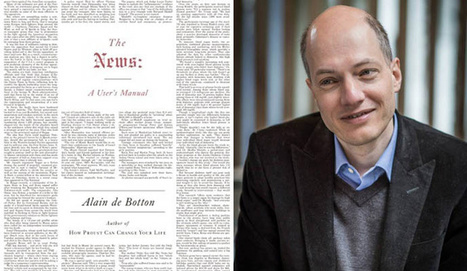"News sources can't just give us the facts. They must tell us what those facts mean."

|
Scooped by Robin Good |
Here's a refreshing look at the future of news that highlights the importance of going deeper into creating value for readers by providing more focus, relevance, context and opinion.
These are the characters that properly define what we now refer to as "curation" when it comes to content and news.
The following passages, extracted from the book, The News: A User's Manual, are by Alain de Botton, and have been excerpted from a lengthy article on The Week entitled "The Future of News".
"News organizations are coy about admitting that what they present us with each day are minuscule extracts of narratives whose true shape and logic can generally only emerge from a perspective of months or even years — and that it would hence often be wiser to hear the story in chapters rather than snatched sentences.
They [news organizations] are institutionally committed to implying that it is inevitably better to have a shaky and partial grasp of a subject this minute than to wait for a more secure and comprehensive understanding somewhere down the line.
...
We need news organizations to help our curiosity by signaling how their stories fit into the larger themes on which a sincere capacity for interest depends.
To grow interested in any piece of information, we need somewhere to "put" it, which means some way of connecting it to an issue we already know how to care about.
A section of the human brain might be pictured as a library in which information is shelved under certain fundamental categories. Most of what we hear about day to day easily signals where in the stacks it should go and gets immediately and unconsciously filed.
... the stranger or the smaller stories become, the harder the shelving process grows. What we colloquially call "feeling bored" is just the mind, acting out of a self-preserving reflex, ejecting information it has despaired of knowing where to place.
...We might need help in transporting such orphaned pieces of information to the stacks that would most appropriately reveal their logic.
...it is news organizations to take on some of this librarian's work. It is for them to give us a sense of the larger headings under which minor incidents belong."
The call for understanding how much greater value can be provided by curating news and information in depth, rather than by following the shallow, buzzy and viral path beaten by HuffPo, Buzzfeed and the rest of the gang, is clear.
But beyond context and depth, real value can only be added if we accept the fact that going beyond the classic "objective fact reporting", by adding opinion and bias in a transparent fashion, can actually provide greater value in many ways, as Alain de Botton clearly explains:
"Unfortunately for our levels of engagement, there is a prejudice at large within many news organizations that the most prestigious aspect of journalism is the dispassionate and neutral presentation of "facts."
...
The problem with facts is that there is nowadays no shortage of sound examples. The issue is not that we need more of them, but that we don't know what to do with the ones we have...
...But what do these things actually mean? How are they related to the central questions of political life? What can they help us to understand?
...The opposite of facts is bias. In serious journalistic quarters, bias has a very bad name. It is synonymous with malevolent agendas, lies, and authoritarian attempts to deny audiences the freedom to make up their own minds.
Yet we should perhaps be more generous toward bias.
In its pure form, a bias simply indicates a method of evaluating events that is guided by a coherent underlying thesis about human functioning and flourishing.
It is a pair of lenses that slide over reality and aim to bring it more clearly into focus.
Bias strives to explain what events mean and introduces a scale of values by which to judge ideas and events. It seems excessive to try to escape from bias per se; the task is rather to find ways to alight on its more reliable and fruitful examples.
There are countless worthy lenses to slide between ourselves and the world."
Overall, these ideas offer a truly refreshing look at the future of news and at the relevance that context and opinion could play in transforming this medium from a vehicle of mass distraction to one of focused learning and understanding for those interested.
Must read. Rightful. Insightful. 9/10
Full article: http://theweek.com/article/index/256737/the-future-of-news
Reading time: 10':20"



 Your new post is loading...
Your new post is loading...








El futuro de las Noticias no es sobre los Hechos, sino sobre contexto, relevancia y opinión.
Intéressant